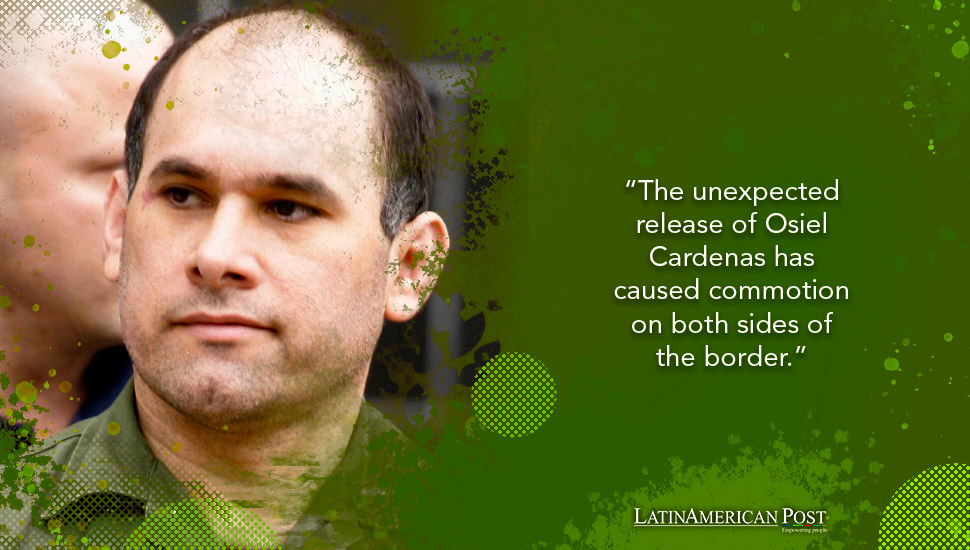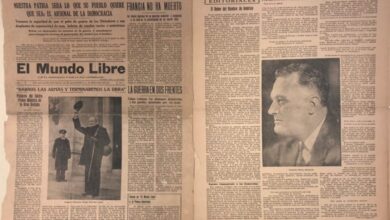The Early Release of Drug Lords Imprisoned in the U.S. and the Latin American Confusion

The early release of notorious drug lord Osiel Cárdenas from a U.S. prison highlights the confusion and insecurity caused by lenient policies across Latin America. This opinion piece argues that such decisions exacerbate the region’s ongoing challenges with crime and justice.
The unexpected release of Osiel Cárdenas, one of Mexico’s most infamous drug lords, from a U.S. prison into the custody of immigration officials has sent shockwaves through both sides of the border. Cárdenas, who once led the Gulf Cartel and founded the hyper-violent Zetas, is directly responsible for some of the most horrific acts of violence in Mexico’s recent history. His early release raises troubling questions about the impact of lenient sentencing and release policies on the fight against organized crime in Latin America.
Cárdenas was sentenced to 25 years in prison in 2010 after being extradited to the United States. Still, his release just 14 years later reflects a broader trend of early releases undermining justice. For a region that has struggled with the devastating consequences of drug trafficking and cartel violence, such leniency is not just a legal issue—it’s a moral one. The decision to release Cárdenas early not only sends a confusing message to the public but also risks emboldening other criminals who see a way out even after committing heinous crimes.
The Impact on Justice and Public Perception
Lenient early releases of high-profile criminals like Cárdenas do more than just complicate legal processes; they erode public trust in the justice system. In Latin America, where many countries are still grappling with high levels of corruption and impunity, the early release of a figure like Cárdenas can be perceived as a sign that justice is negotiable. This perception is dangerous in a region where the rule of law is already under strain.
The public’s reaction to Cárdenas’ release reflects a broader concern that justice systems are failing to hold powerful criminals accountable. When a notorious drug lord is released early, it not only undermines the sentences imposed by courts but also diminishes the suffering of victims and communities ravaged by cartel violence. The perception that criminals can evade full punishment for their crimes weakens the deterrent effect of the legal system and contributes to a cycle of violence and lawlessness.
Leniency and the Cycle of Violence
The leniency shown in the early release of criminals like Cárdenas can have far-reaching consequences beyond public perception. It can directly impact the cycle of violence that has plagued Latin America for decades. The Zetas, the criminal organization Cárdenas helped create, were known for pioneering some of the most brutal tactics in the drug trade, including beheadings, kidnappings, and extortion. The early release of a figure associated with such violence sends a dangerous signal to current and future cartel members that even the most severe crimes may not result in full accountability.
This cycle of violence is further exacerbated by the uncertainty surrounding the consequences of Cárdenas’ release. If he is deported back to Mexico, where he still faces outstanding charges, there is no guarantee that he will serve the remainder of his sentence. Moreover, his release could potentially reignite old alliances or rivalries, leading to renewed violence in areas already struggling with cartel activity. Lenient policies that allow for such outcomes do nothing to stem the tide of violence and may contribute to its perpetuation.
A Call for Stronger Legal Frameworks
The release of Osiel Cárdenas should serve as a wake-up call for policymakers and justice systems in the United States and Latin America. There is a pressing need for more robust legal frameworks that ensure those who commit serious crimes, particularly those involving organized crime and violence, serve their entire sentences. Early release policies, while often well-intentioned, must be carefully scrutinized, mainly when they apply to individuals whose crimes have had widespread and devastating impacts.
More robust legal frameworks would provide clearer sentencing and release guidelines and reinforce the rule of law in regions where it is most needed. Ensuring that figures like Cárdenas are held accountable for the entirety of their sentences would send a strong message that justice is not negotiable and that the total weight of the law will be brought to bear on those who undermine peace and security.
Also read: Drug Trade Perpetually Undermines Colombia’s Quest for Peace
The early release of Osiel Cárdenas highlights the dangers of lenient sentencing and early release policies in the context of organized crime in Latin America. Such decisions contribute to a sense of confusion and insecurity, eroding public trust in the justice system and perpetuating the cycle of violence. More robust legal frameworks are needed to combat these challenges and ensure those responsible for serious crimes are entirely held accountable, providing a necessary deterrent and restoring faith in the rule of law.





